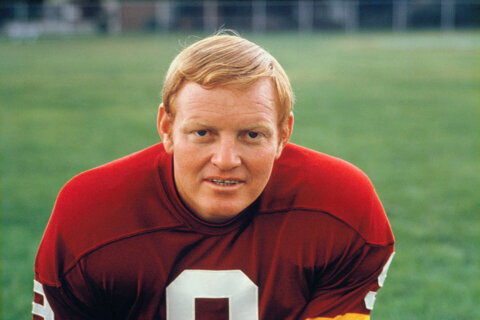WASHINGTON — This weekend hasn’t been kind to the Washington Wizards. Just a week after the end of the NBA season, before the free agency period has even kicked into high gear, they have already been written off for dead in the sweepstakes for the prized piece of this year’s class, Washington native Kevin Durant.
Word dropped Friday that Durant was working to set up meetings with multiple teams at a single location beginning July 1, possibly in New York. Those teams included the Boston Celtics, Golden State Warriors, LA Clippers, Miami Heat, San Antonio Spurs and the Thunder. That piece called the Wizards “outsiders” to even land an audience with Durant, a player they have spent two years preparing for. On Sunday, a source even leaked that they thought it was unlikely Durant would sign with Washington.
And why would he? Durant just spent the last year watching what he and Russell Westbrook can accomplish when both are healthy, taking the Thunder within a hair of knocking off the greatest regular season team in NBA history in the Western Conference Finals. Why come to Washington, a team that couldn’t even make the playoffs with few if any real contenders beyond the Cleveland Cavaliers?
While the Thunder were getting younger and deeper around Durant this week, adding Victor Oladipo and draftees Damontas Sabonis and Daniel Hamilton, the Wizards were … well, they were doing nothing. Both teams were among the six without a single pick in this year’s draft, but the Thunder went out and got proactive to continue to get better, regardless of Durant’s eventual decision.
What do all of the teams tied to meetings with Durant have in common that the Wizards don’t? They’ve all been playoff teams the last couple years and they’ve already built themselves into a position to win before Durant even became a possibility.
This doesn’t mean the Wizards shouldn’t make an offer for Durant — it’s literally the least they can do. But despite their not-so-transparent efforts (signing his former NBA coach Scott Brooks and his former high school coach David Adkins) that ship appears to have sailed.
What they shouldn’t do is throw a max contract at Joakim Noah. Already 31, Noah’s coming off an injury-plagued campaign that easily rates as the worst of his career. While he provides a solid rebounding presence and good passing from a big man (when healthy), he hasn’t shot 50 percent from the field since 2011-12 and has never scored more than 12.6 points per game. Given his age and health, that’s the kind of player you make a value play at, rather than an overpay.
It’s not that the Wizards don’t need help along the front line. But they need help everywhere. If you’re going to throw a bunch of money at that particular problem to look for a fix, at least go with someone young who will give you the prime years of his career, like Hassan Whiteside (27) or Bismack Biyombo (23). Yes, they are very different players than Noah, but it’s not like he was a real replacement for Durant anyway.
What the Wizards need more than anything is depth: the kind that smart teams like the Spurs and Warriors have built through the draft. We don’t need to revisit the draft woes that have put Washington in this place while the Spurs and Warriors have built themselves into dynastic powerhouses. But Washington’s lack of depth was on display early and often with the injuries sustained last season, further underscoring the need for a deeper cast of capable players.
Washington sat out Thursday’s NBA Draft after trading away their first-round pick for Markieff Morris, and their second round pick as part of the Kelly Oubre deal. And while they could have made a deal to net themselves at least one talented young player, President Ernie Grunfeld didn’t see a worthwhile opportunity.
“If something popped up and we felt it could help us, (a) player that we were looking at was there, then maybe we could have jumped into it,” he said after the draft. “But that opportunity never presented itself.”
Let’s talk about the second round. Seton Hall’s Isaiah Whitehead (42nd overall) is the kind of instant offense bench guard the Wizards have lacked. Purdue’s A.J. Hammons (46th) is a seven-footer with good footwork who averaged 15 points on nearly 60 percent shooting along with 8 rebounds and nearly 3 blocks a game. Syracuse’s Michael Gbinije (49th) is a heady, oversized guard with a smooth stroke from long distance. Kay Felder (54th) was a mid-major star at Oakland, where he led the nation in assists and finished third in scoring, just below Buddy Hield.
These players may not have made immediate impacts on every team. But they would have been instant fits into the rotation in Washington — which currently has just five players under contract (plus restricted free agent Bradley Beal) — making it all the more mystifying why the Wizards wouldn’t consider trying to fit one into their plans. The team reportedly signed four players after the draft who could potentially help, but likely none with the immediate impact of those above.
But at least it’s a start. The Wizards may have missed their shot at Durant by being too focused on him alone. At least they can learn the lesson to work to build a winner worthy of a player of his caliber’s attention in the future.







